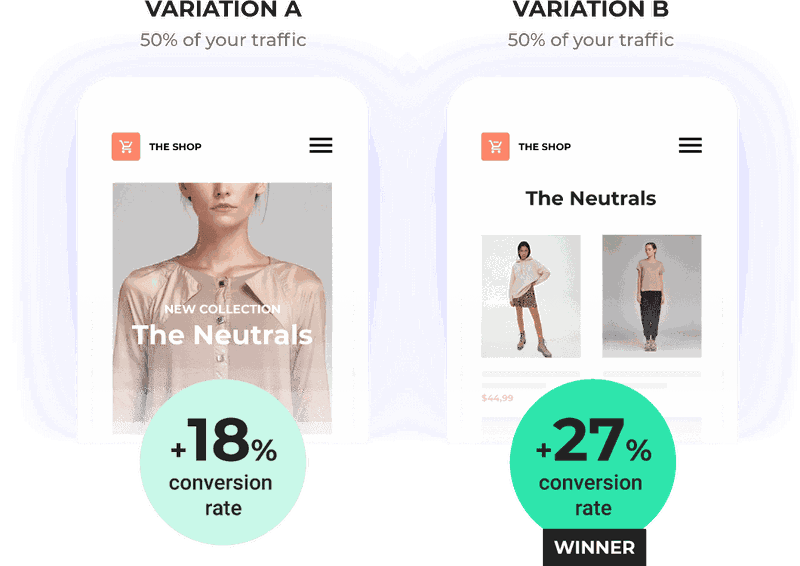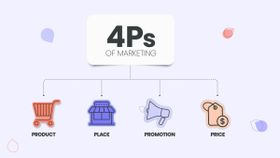How to Grow the Ultimate Marketing Team from Scratch
The Ultimate Guide on growing your Marketing Team, which roles you should hire for, which skills you need, and how to know when to expand.
Updated November 7, 2024

You’ve got an absolutely killer product or service. You just know your customers are gonna love what you have to offer. It’s the best thing since sliced bread if you do say so yourself.
So…why isn’t anyone buying it?
Quite possibly, it’s because you need to start investing in a marketing team.
Recognizing that this is the next phase in your company’s evolution is an important step all on its own. But once you know you need a marketing team, what’s the next step after that? How do you figure out what kind of marketing you need, and who to hire for the job?
To help take the guesswork out of the process, here’s a primer on building a marketing department that’s perfectly suited to your business. Consider this as your field guide to navigating the wide world of marketing teams.
What is the role of a marketing team in a business?
A marketing team is there to help your business prosper by winning more customers and making more sales. In practice, there’s a bit more to it than that. A marketing team’s role can vary widely based on the goals and structure of the business.
Digital marketing encompasses a broad array of tasks: designing websites, copywriting, researching competitors, optimizing online content for search engines, running ad campaigns, analyzing metrics, and much more.
Of course, none of these things happen in isolation. The work of the marketing department is complementary to the company’s other departments. It’s entwined with the success of the organization as a whole.
At its core, the marketing team’s job is to ensure that the company is able to articulate and communicate its message to the audience that matters most—its current and potential customers.
How do you identify key marketing needs?
This question might seem like a bit of a catch-22: do you have to become a marketing expert in order to find out what marketing experts you should hire?
Well, no—but you will have to do some deep digging into what your business needs before you start putting any marketers on the payroll.
Chris Martin, CMO of hybrid research agency and tech firm FlexMR, says that this step is critical.
“Before you can even start to think about what skills or traits any future marketing team will need, you’ll first have to understand what exactly it is they will be doing. This will become the bread and butter of the team, the things that need to be done on a recurring basis—from strategic audits and price setting to copy and graphic design. The full gamut of macro and micro activities.” - Chris Martin, CMO at FlexMR, Forbes 30 under 30
Aaron Agius leads an SEO & Content Marketing Agency called Louder.Online and he agrees. He explains that even if you’re just starting to bulk up the marketing capabilities of your company, it’s imperative to have clear goals.
“Are you trying to rank higher in organic searches with SEO? Do you want to build your authority with highly produced videos? Understanding where you're headed will inform how you build out your content marketing team.” - Aaron Agius, Co-founder of Louder.Online
Solid advice, but how exactly do you go about following it?
First, you should look into your existing marketing strategy. And if you don't have one, here's how you go about it creating it.
A good starting point is to examine your customer base and divide your customers into segments based on their needs.
- Who are your potential customers?
- What do they want when they come to your business?
Answering these questions can help you identify groups that are not being reached by your current marketing efforts or could be reached more effectively.
This can help you come up with ideas about how to get your message to those target groups. Which promotional tactics will be most useful in bringing your brand to those individuals—
- Clever social media campaigns?
- Content marketing in the form of high-value, actionable articles?
- Good old-fashioned banner ads?
You should also identify where your target audience hangs out. Which social media platforms they use, which blogs they read, what type of content they consume. This kind of data will help you choose the best marketing channel to use for each audience segment.
Now you’re getting a clearer sense of who you need to hire to accomplish those goals and reach your audience.
Most common marketing team structures
When it comes to structuring your marketing team, there’s one question that needs to be answered right out of the gate: will you hire full-time, in-house employees, or will you contract with agencies or freelancers?
Conventional wisdom holds that full-time employees are generally preferable to contractors. But that consensus may be shifting. Rand Fishkin, the Co-founder of SparkToro, is a big advocate for using agencies and freelancers wherever possible.
“In my first decade as a tech CEO, I consistently got advice about how building a great team was essential to building a great business. It was always: hire full-time employees in areas where you need a competitive advantage. Only hire agencies for functions you want to put on autopilot or don’t need to be good at.” - Rand Fishkin, Co-founder of SparkToro
While he followed that advice initially, it didn’t last.
“Like many ‘best practices’ from my former life, I eventually questioned, and now have entirely reversed course on building an internal team vs. using agencies, consultants, and contractors.” - Rand Fishkin, Co-founder of SparkToro
He lays out a compelling case for why they’re the better option in most scenarios, based on factors such as time to effective productivity, the flexibility of cost, emotional resources required, and replacement time and effort.
That being said, there are plenty of situations where in-house employees just make more sense.
For example, if there’s enough workload for one graphic designer across all of the company’s projects, it might be more efficient to hire a single full-time employee rather than hiring a different contractor for each task.
Companies with highly specialized products or services may also benefit from having an in-house team that can quickly and easily communicate specific details to their colleagues.
Beyond these logistical reasons, some business leaders simply prefer the camaraderie that develops from working closely with the same group of people over an extended period of time. Many companies find that a combination of the two is the ideal approach.
Whichever route you choose, you’ll then be faced with the next big decision: how do you structure your marketing team?
Again, the answer depends on the existing structure of your company, as well as its goals and plans. Here are some of the more common marketing team structures to help you brainstorm.
- Segment-based - divided by the audience they focus on. For example, the team may be divided into B2B and B2C departments, or a local unit and a national unit.
- Customer-based - divided by the stage of the conversion funnel. One unit may focus on raising brand awareness, one on driving customer interest, and one on improving conversions.
- Product-based - divided based on product specializations. This system can work particularly well for businesses with a diverse range of services or products that don’t all target the same demographic.
- Functionally divided - organized around the marketers’ specific roles. Content marketing would be one unit, public relations would be another unit, and digital advertising would be another.
- Hybrid - combine elements from two or more of these structures. This is the most commonly utilized method of organizing a marketing department, especially for small to mid-sized businesses which usually have each marketing employee handling multiple responsibilities.
What are the different marketing roles you need on your team?
When you’re starting from scratch, it can be hard to envision what a full-fledged marketing team actually looks like. And, frankly, you don’t need a huge marketing team to see results.
Gary Vaynerchuk, the VaynerMedia CEO better known as Gary Vee, believes that you really only need four people to have a successful marketing department:
- Art person - to provide eye-catching graphics and design
- Math person - to crunch the numbers on ROI and other key metrics
- Video person - to both shoot and edit footage
- Written word person - to provide marketing copy in all its many forms
If you’re just getting your marketing department off the ground, you can’t go wrong with Gary Vee’s formula.
But at some point, you’ll likely want to expand beyond that core team. Here’s a quick breakdown of the essential roles that a more fully developed marketing department may include.
Team Leader / Marketing Manager
This role is of vital importance to the success of your marketing department and, ultimately, your business.
A marketing team lead (sometimes called the Director of Marketing) is responsible for the planning and execution of the company’s marketing strategies. The right person for this role will have a talent for both creativity and analytical thinking.
This person would also manage your digital marketing team, manage all the marketing campaigns, be in charge of the hiring process, onboard new marketing hires, and have weekly meetings with each employee.
This is an intensely collaborative position. Marketing managers need to work closely with colleagues both on their own team and in other departments, as well as peers in other companies and organizations.
Similar titles that fit this role:
- Chief Marketing Officer
- Marketing Director
- Marketing Lead
- Head of Marketing
- Growth Marketing Manager
SEO Strategist
The goal of a search engine optimization strategist is to get more organic traffic to your website. SEO is a huge part of consumers' buying process.
SEO specialists research keywords, analyze competitors’ sites, stay on top of Google’s algorithm changes, and optimize your site to ensure that your content stays at the top of the search results. They also collaborate with other blogs on backlink campaigns and guest posts.
These methods can make a huge difference in the number of people who find your site from organic search and engage with your company.
Content Creator
Depending on what your marketing plans entail, the “content” part of “content creator” can vary widely.
At the very least, you’ll need someone who can write polished, impactful copy: email marketing campaigns, blog posts, long-form content, website copy, all that good stuff. It could be an email marketer, Instagram expert, a content marketer, or even a social media manager.
Eventually, you’ll likely want to consider hiring creators for other forms of content as well. That might include video, podcasts, white papers, infographics, brand photography, and more.
When you’re hiring for this position, remember—you don’t just want someone who’s artistically talented (although that is an important part of the equation). You want someone who knows how to leverage their creativity into conversions.
Ads Specialist
Ads specialists develop and manage advertising campaigns on social media platforms, online marketplaces, and search engines.
This could be a Google Ads specialist who focuses on Google Shopping campaigns or display ads or a Facebook ads specialist who does Facebook and Instagram ads. If you're an eCommerce business and sell products on Amazon you might even want an Amazon PPC expert to manage your campaigns there.
Performance marketing requires constant optimization and it's best to hire someone who specializes in the specific channel where you're running your ads. Depending on your industry and target audience, you may also consider hiring an ads specialist who focuses on other channels, such as social media, TV, radio, or print.
Website designer
A good website is one of the non-negotiable requirements of a successful business in the digital era. Your site should be aesthetically pleasing, easy to navigate, and effective in driving conversions.
As you’re looking for the right candidate for this role, keep an eye out for someone who can provide a balance of all of these different aspects. While it may be tempting, don’t just go for the designer whose portfolio is the prettiest. Your website does need to be well-designed and technically sound, but it also needs to be finely tailored to your business.
A highly skilled website designer can help create a site that serves your customers’ needs and supports your company’s goals.
Analytics & Operations Specialist
A marketing operations specialist is someone who identifies problems, investigates causes, and comes up with solutions to streamline and optimize processes within the company.
An analytics specialist is a closely related role that focuses on measuring and analyzing specific metrics to improve efficiency and increase customer retention. They need to have a deep understanding of your various data systems and analytics tools (like Google Analytics or Mixpanel) and know how to make informed decisions to help you meet your business goals.
A marketing analytics expert can help you determine the effectiveness of your marketing efforts and decide where to make adjustments so that you can reap even more benefits from your available resources.
Conversion rate optimizer
The duties of a conversion rate optimizer may overlap with an analytics specialist, but this role is even more specific.
While an analytics specialist might look at the efficacy of a wide variety of marketing strategies, a CRO focuses exclusively on how to increase the percentage of conversions on your website.
Through A/B and multivariate testing, a CRO can help turn your website into a well-oiled machine that converts visitors into customers. Many small businesses won’t have the budget to hire an in-house CRO, making this one role that’s especially well suited to outsourcing with a freelancer or agency.
Keep in mind that you don’t need to fill all of these roles at once. (In fact, you probably shouldn’t.) This may seem like a long list—perhaps intimidatingly long when you’re starting from zero.
But remember, each role doesn’t have to translate into one employee. As you’re starting out, you’ll probably find that it’s most efficient to have each individual employee cover more than one of these positions.
Hopefully, this gives you an idea of what your marketing department can grow towards as your business continues to expand.
When should you grow your marketing department?
It goes without saying that a freshly founded startup won’t have the same marketing needs—or budget—as one of the Fortune 500. Like other aspects of your business, your marketing department needs to be flexible enough to change and adapt alongside your company.
So how do you know when it’s time to expand your marketing team?
Each company’s journey is unique—so realistically, there’s no hard and fast rule. The answer is: when you need to and when you’re able to.
This is another instance where collaborating with a freelancer or agency might be the right solution. By hiring a contractor or agency, you can rapidly extend your marketing capabilities without the time and cost of taking on a new full-time employee.
If you want to try broadening your marketing horizons, you can hire a contractor for a single ad campaign, assess the campaign’s efficacy, and then decide whether to scale up or down from there.
Here's a rule of thumb from Chris Walker, CEO of Refine Labs.
"As your company size increases, marketers should consistently make up about 10% of your total employees.” - Chris Walker, CEO of Refine Labs
What should you look for when hiring a marketer?
Even after you know what you need your marketing team to accomplish, finding the right person or people for the job can feel like a daunting task. But it doesn’t have to be. These are the key factors that you’ll want to take into consideration:
- Does the candidate’s expertise align with the company’s plans and goals?
- Do they have the experience and background necessary to understand your target audience?
- Can you afford them? Does their salary or payment rate align with your marketing budget?
- Are they a good fit for the company culture?
Many business leaders recommend not getting too hung up on the details in a candidate’s resume.
Tim Soulo, CMO of SEO tool Ahrefs, asserts that it makes more sense to hire people based on their traits and capabilities rather than viewing them through the lens of a narrow range of tasks. In his experience - “smart, responsible and hardworking hires … can handle anything.”
When you go looking for digital marketers to hire, you’ll run into the age-old question of choosing between generalists and specialists. Soulo’s advice? Don’t sweat it.
“I don’t look at my team members as generalists or specialists. All I need are people who are capable of getting important work done.” - Tim Soulo, CMO of Ahrefs
6 Tips on building a modern marketing team (advice from a marketing manager)
Once you commit to growing your marketing team, it’s important to consider how that team will fit into the larger framework of your business. As a content strategist, Karen McCandless points out, collaboration is key.
“A marketing department is not an island. A marketing team is at the heart of any business and will have to work with most other departments, from sales to customer service to accounting.” - Karen McCandless, Content Strategist
Because marketing is so intricately linked to the other facets of your business, McCandless recommends cross-functional integration, where marketers are included in the processes and planning of other departments. “This shared expertise will help you better serve customers and boost revenue,” she adds.
Here's a step-by-step process to follow to build a high-performing marketing team.
1. Study your target audience
Where does your target audience hang out online? Which social media platforms they spend the most time on? Identify the specific channels that you will need to master to get conversions. Before you start building out an entire team, first hire the marketers that are profficient in those specific channels.
2. Define your business goals
What are the KPIs that you want to hit this year? Those will define the type of skill sets that you'll need on the team. A lot of business owners expect a ton of sales to come from organic social media posts without having to invest in ads or influencers. Don't be that guy or gal. 😅
3. Look for the expertise first
The most important thing to look for in marketing is experience and a proven track record. So the first thing you should do is to look for an expert - that could be in your own network or on a platform like Mayple 😎.
4. Decide on full-time vs freelance
Don't rush into hiring an in-house marketing team. You can totally run a successful team that's fully remote. Focus on expertise and good synergy between your existing resources (your product and sales teams) and the new hire.
5. Focus on continuous improvement
Don't onboard a new hire with the expectation that they bring you results in month 1 or even month 2 (unless they do ads of course). Your focus should be on improvement in engagement and traction with your ideal customer persona.
6. Caution: if you're managing the team internally
Let's say you hire an entire marketing team but then the person who manages it is your CEO or COO or Head of Operations. If he doesn't understand marketing intimately, he may become a roadblock to the innovation and creativity of the team.
Takeaways
So there you have it—the basic steps of building a modern marketing team. To recap:
- Identify your company’s specific marketing needs.
- Decide whether you’ll hire full-time employees or marketing consultants to get the job done.
- Establish how you’ll organize your marketing department and what roles you’ll need to fill.
- Hire the right talent.
Having a strong marketing department is a game-changer for any business. It might take a little trial and error at first. But once you dial in on your marketing dream team, the results will be more than worth it.
FAQs
What are the 7 marketing functions?
All marketing activities break down into seven main functions.
- Promotion - things like social media marketing, content strategy, and partnership/affiliate programs, search engine marketing, new product launches
- Selling - overlaps with business growth initiatives like lead or demand generation / cold outreach / events and trade shows
- Product management - focusing on the user experience and product development
- Pricing - creating effective pricing strategies for different market segments
- Marketing information management - making sure social media content and all branding is uniform across the different initiatives
- Financing
- Distribution
How many people should be in a marketing team?
That completely depends on your business structure, marketing goals, capabilities, budget, business objectives, size of the project, and business stage.
Startups usually hire one marketing lead that runs a variety of channels - like social media management, email marketing, conversion rate optimization, Facebook/Google ads, content creation, graphic design, marketing automation, and video production.
Larger businesses have more budget and greater needs for specialized experts. They may work with external marketing consultants and build cross-functional teams that focus on a specific product line or vertical.
What is the role of a marketing team?
The role of any marketing team is to promote the product or service through digital and physical channels. They reach out to prospects, nurture leads, and create content that delights existing customers.
Who leads a marketing team?
Usually, there is one marketing leader (a director of marketing or marketing manager) who is in charge of the entire team. In smaller marketing organizations, it could be the business owner or CEO who oversees the department directly.
The most important thing is that this person should be familiar enough with marketing to let the team jump on market trends and improve performance through creative initiatives.








